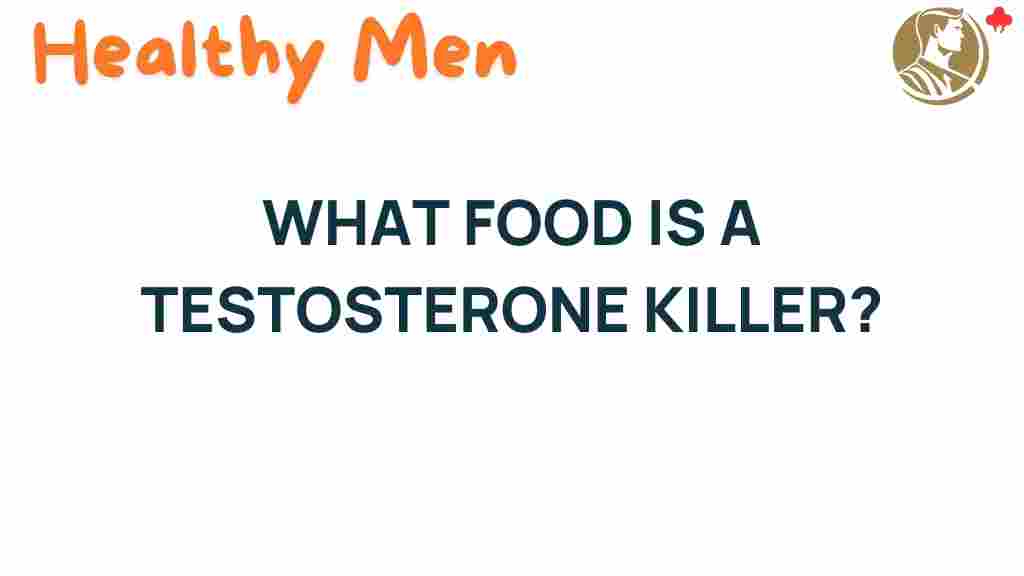Unmasking the Testosterone Killers: What Foods to Avoid for Optimal Health
Testosterone is a vital hormone that plays a crucial role in men’s health, affecting everything from muscle mass and strength to mood and energy levels. However, certain dietary choices can negatively impact testosterone levels, leading to hormonal imbalances and decreased performance. In this article, we will explore the foods to avoid, the effects of diet on testosterone, and how to maintain hormone balance through nutrition and lifestyle changes.
Understanding Testosterone and Its Importance
Testosterone is often referred to as the male hormone, although it is present in both men and women. It is essential for:
- Building and maintaining muscle mass
- Regulating fat distribution
- Supporting bone density
- Enhancing mood and cognitive function
- Boosting libido and sexual performance
As men age, testosterone levels naturally decline, but poor diet and lifestyle choices can accelerate this process. Understanding the effects of food on testosterone levels is crucial for maintaining optimal health.
The Link Between Diet and Testosterone
Nutrition plays a significant role in hormone balance. A well-rounded diet can support testosterone production, while certain foods can hinder it. Here are some key points to consider:
- Balanced Macronutrients: A diet rich in proteins, healthy fats, and carbohydrates can encourage hormone production.
- Micronutrient Importance: Vitamins and minerals, especially zinc and vitamin D, are critical for testosterone synthesis.
- Avoiding Processed Foods: Highly processed foods often contain unhealthy fats and sugars that can disrupt hormone levels.
Foods That Are Testosterone Killers
Now that we understand the importance of testosterone and diet, let’s delve into specific foods that can negatively affect testosterone levels.
1. Soy Products
Soy contains phytoestrogens, which can mimic estrogen in the body. High consumption of soy products, such as tofu, soy milk, and edamame, may lead to lower testosterone levels. While moderate consumption may be fine, it’s best to limit intake if you’re concerned about hormone balance.
2. Flaxseeds
Similar to soy, flaxseeds are rich in lignans, which are also phytoestrogens. They can potentially interfere with testosterone production, so consider using them sparingly in your diet.
3. Processed Foods
Processed foods are often high in trans fats and sugars, which can lead to obesity and insulin resistance—two factors that negatively impact testosterone levels. Examples of processed foods include:
- Fast food
- Packaged snacks
- Sugary beverages
4. Mint
While mint can be refreshing, it may lower testosterone levels due to its menthol content. If you’re consuming large amounts of mint in teas or desserts, consider reducing your intake.
5. Alcohol
Excessive alcohol consumption can disrupt hormone production and lead to decreased testosterone levels. Moderation is key; limiting alcohol to an occasional drink can help maintain hormone balance.
6. Dairy Products
Some studies suggest that dairy products, particularly those high in fat, may contribute to lower testosterone levels. This could be due to the presence of hormones in milk or the way dairy affects insulin levels. Opt for low-fat or plant-based alternatives when possible.
7. Vegetable Oils
Many vegetable oils, such as canola and soybean oil, are high in omega-6 fatty acids, which can promote inflammation and disrupt hormonal balance. It’s better to use oils that are rich in omega-3 fatty acids, such as olive oil or coconut oil.
Step-by-Step Process to Improve Testosterone Levels
To enhance testosterone levels through diet and lifestyle, follow these steps:
Step 1: Evaluate Your Current Diet
Start by keeping a food diary for a week. Note down everything you eat and drink. This will help you identify foods that might be detrimental to your hormone balance.
Step 2: Eliminate Testosterone Killers
Based on your evaluation, eliminate or significantly reduce the intake of testosterone-killing foods mentioned above. Aim for a balanced diet that supports hormone health.
Step 3: Incorporate Testosterone-Boosting Foods
Replace harmful foods with those that promote testosterone production. Consider adding:
- Lean meats, such as chicken and turkey
- Fish rich in omega-3 fatty acids, like salmon
- Eggs, which are packed with protein and cholesterol (a precursor for testosterone)
- Leafy greens, like spinach and kale, which are high in magnesium
- Nuts and seeds, particularly almonds and pumpkin seeds
Step 4: Maintain a Healthy Lifestyle
Diet is just one piece of the puzzle. To optimize testosterone levels further, consider these lifestyle tips:
- Engage in regular physical activity, focusing on strength training and cardiovascular exercises.
- Prioritize sleep, aiming for 7-9 hours per night to support hormone production.
- Manage stress through mindfulness practices such as meditation or yoga, as high stress can lead to elevated cortisol levels, which negatively impact testosterone.
Troubleshooting Tips for Hormone Balance
If you’ve made dietary and lifestyle changes and are still experiencing low testosterone levels, consider the following:
- Consult with a healthcare professional to rule out underlying medical conditions.
- Get your testosterone levels checked through a blood test for a clearer picture of your hormone status.
- Consider supplements, such as vitamin D or zinc, but always consult with a doctor before starting any new regimen.
Conclusion: Prioritize Your Health Through Smart Nutrition Choices
Understanding the impact of diet on testosterone levels is essential for maintaining overall health and performance. By identifying and eliminating testosterone killers from your diet, you can enhance your hormonal balance and improve your quality of life. Remember that nutrition is just one aspect of a healthy lifestyle; combining a balanced diet with regular exercise, adequate sleep, and stress management will yield the best results for men’s health.
For more information on how to enhance your testosterone levels naturally, check out this comprehensive guide. Additionally, consider exploring this external resource for further insights into nutrition and hormone health.
This article is in the category Nutrition and created by healthymen Team
